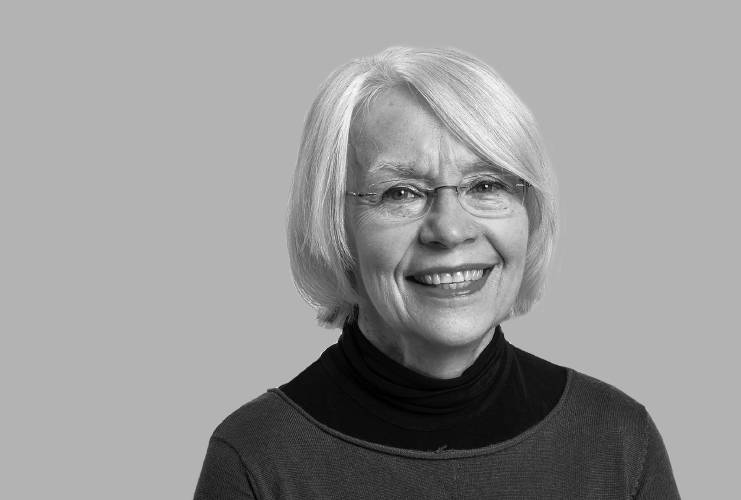Columnist Susan Wozniak: Hannah Arendt, Golda Meir — Truths to be listened to

Susan Wozniak FILE PHOTO
| Published: 11-01-2023 11:39 PM |
Just before covid struck, I began thinking about Hannah Arendt. I knew little of her other than she witnessed the trial of Adolf Eichmann in Jerusalem, and, that she coined the phrase, “the banality of evil.” Due to what was happening socially and politically, I thought it time to read/reread the work of this woman considered one of the great political analysts of the 20th century.
I was not alone. The Osher Life-Long Learning Institute offered a course on Arendt. I bought Arendt’s “The Origins of Totalitarianism” and subscribed to the course.
Returning to the present, as a long-time volunteer at Shakespeare and Company, I was happy to usher for the one-woman show, “Golda’s Balcony,” starring Annette Miller as the fourth prime minister of Israel, Golda Meir. Shortly thereafter, I saw the film “Golda” with my favorite actress, Helen Mirren, portraying the prime minister. Golda, like Hannah, made her presence felt during her long career, not as a philosopher but as an activist.
Beyond being pleased to watch senior actresses deliver works probing the real career of a woman leader, I wondered about the history of the Yom Kippur War on which the scripts revolved. Many of us are old enough to have seen Golda being interviewed on television. We heard both negative and positive opinions expressed about her. I began to think what if it is now time to reconsider Golda as it is to reconsider Hannah.
However, that was prior to Oct. 7, 2023.
Until my current research, I had only heard the 1973 conflict called the Yom Kippur War because it was launched on the Jewish Day of Atonement. The conflict has four other names, but the only name to consider is the Ramadan War because Egypt and Syria launched their surprise attack on the 10th day of Ramadan. Both sides were in the midst of the most important religious events on their calendars.
Raised as a Roman Catholic, I have slight knowledge of Judaism and less of Islam. I knew Ramadan was a time for individuals to fast and to concentrate on spiritual growth, one of the “five pillars” of Islam. The others are a declaration of faith, daily prayers, giving alms and a pilgrimage to Mecca. Ramadan also celebrates Allah’s revelation of the Quran to the Prophet Muhammad.
Yom Kippur, too, involves fasting. Its main purpose is to seek from God forgiveness for our own sins and to forgive others for theirs.
Article continues after...
Yesterday's Most Read Articles
 A rocky ride on Easthampton’s Union Street: Businesses struggling with overhaul look forward to end result
A rocky ride on Easthampton’s Union Street: Businesses struggling with overhaul look forward to end result
 Northampton school budget: Tensions high awaiting mayor’s move
Northampton school budget: Tensions high awaiting mayor’s move
 Northampton man held without bail in December shooting
Northampton man held without bail in December shooting
 Hadley eyes smart growth zoning district
Hadley eyes smart growth zoning district
 ‘None of us deserved this’: Community members arrested at UMass Gaza protest critical of crackdown
‘None of us deserved this’: Community members arrested at UMass Gaza protest critical of crackdown
 Extreme weather forces valley farmers to adapt
Extreme weather forces valley farmers to adapt
Both holy events seek community. At loss to understand the cause of this war, I turned toward Hannah the theorist. Deep in her massive book is a chapter devoted to totalitarianism. Despite not seeing totalitarianism as a cause of the attack, I understand Arendt’s crediting the success of totalitarian movements to “the accidental failure of the traditional political sources — liberal or conservative, national or socialist, republican or monarchist, authoritarian or democratic.” The failure in this case led to wars in 1948-49, 1956, 1967, 1973, 1982, 2006 and this month’s war.
However, in September 1978, U.S. President Jimmy Carter invited Egyptian President Anwar Sadat and Israeli Prime Minister Menachem Begin to the rustic retreat known as Camp David. It is a shame that Hannah died before Carter and his Secretary of State Cyrus Vance worked out the details as I think she would have applauded. Although President Carter was not the only president or cabinet level official to stop wars between other nations, his action illustrates what happens when government is used to explore peace. While Golda was alive when the three principals met at Camp David, she died before the accords were signed.
Both Hannah and Golda were born into Jewish families in Europe. Each lived through three quarters of the 20th century. Golda had no direct contact with the Nazis, while Hannah was held in a camp in the Pyrenees. Both women lived in the United States, Golda as a child and into young adulthood and Hannah, after her escape from the camp, fled Europe for New York where she established her career as writer and teacher. They met just once through mutual acquaintances. I found nothing about that meeting.
Both were sometimes misunderstood. Golda for having said, “You cannot negotiate peace with somebody who has come to kill you.” Hannah for writing about “the banality of evil.” While these statements look fierce, they tell truths that should be listened to.
Susan Wozniak has been a case worker, a college professor and journalist. She is a mother and grandmother.

 Columnist John Sheirer: Eclipse eclipsed expectations
Columnist John Sheirer: Eclipse eclipsed expectations My Turn: Quabbin region will never see any bounty
My Turn: Quabbin region will never see any bounty Guest columnist Gwen Agna: Why I voted for school board budget
Guest columnist Gwen Agna: Why I voted for school board budget Frank Higbie: Don’t cancel student debt
Frank Higbie: Don’t cancel student debt
